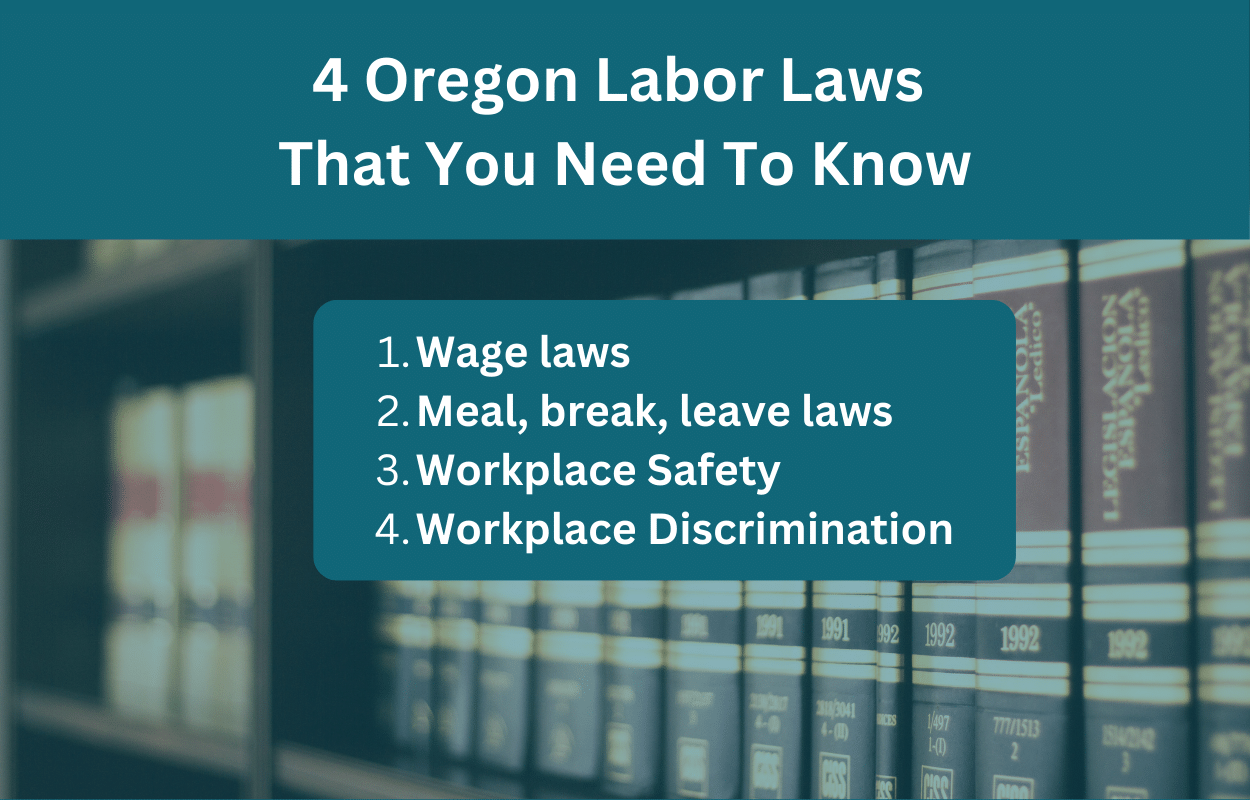Are you curious about the ins and outs of employment law in Oregon? Are you questioning your rights as an employee or perhaps, as an employer? Understanding labor employment law can be intriguing yet complicated terrain. This article aims to pave a smoother road for you, shedding light on this crucial area.
What Is Labor and Employment Law?
Labor and employment law serves as a comprehensive framework that governs the relationship between employers and employees, particularly focusing on workers’ rights. Essentially, it’s like the rulebook for workplaces across all industries. From factors such as wages and working hours to workplace discrimination and safety regulations – these laws ensure fair treatment of workers while also maintaining employer interests.
In the State of Oregon?
In particular, Oregon has set forth its unique legislation, which reflects both federal laws as well as state-specific regulations aimed at protecting residents employed within its jurisdiction. For instance – Did you know that unlike federal law, Oregon labor law requires most shift workers to have at least one ten-minute paid rest break during each four-hour shift?
Keeping up with such details could feel quite overwhelming. Yet knowledge of these specifics might largely impact your overall work experience or come handy while addressing any potential disputes.
Examples of Labor and Employment Law Cases?
Let me present some real scenes from around us illustrating labor employment laws in action:
- A case came forward where an employee was denied her rightful maternity leave by her employer stating business issues – An explicit violation of Family Medical Leave Act (FMLA) under both Federal as well as Oregon-specific laws.
- There have been instances where several restaurant chain employees were not provided their entitled meal breaks resulting in overtime pay misappropriations- again clashing against wage and hour laws specific to Oregon.
Navigating through such complex situations becomes lesser daunting when armed with right legal knowledge pertaining specifically to your locale – your very own State of Oregon!

Oregon Labor Laws
Even though federal and state labor rules are quite different, what are your rights as an Oregon employee? How many consecutive days without a day off can you work? Is it possible to be fired for no reason? The purpose of Oregon’s labor laws are to safeguard employees while also promoting the state’s economic well-being. If you don’t find the solution to your issue here, please don’t hesitate to contact us at Meyer Employment Law, and we will try our best to assist you.
Oregon Wage Laws
Minimum Wage
As per OR Statute 653.02 and OR Statute 653.026, the minimum wage in Oregon is location-based. The minimum wage currently stands at $12.00 per hour in non-urban regions, $12.75 per hour in typical counties, and $14.00 per hour in the Portland metropolitan area as of July 1, 2021.
Tip Minimum Wage
A separate minimum wage for tipped workers is not in place in Oregon. Even if a tipped employee earns just a small quantity of gratuities, the employer must pay the entire minimum wage. OR Statute 653.035(3).
Equal Pay
Regardless of race, color, religion, sex, gender identity, sexual orientation, national origin, marital status, veteran status, disability, or age, Oregon companies must pay equal wages for equal labor regardless of these factors. It is not possible to attain equal pay by reducing wages. Businesses must display an updated Oregon Equal Pay Notice to workers in a familiar place if it isn’t included in a labor law poster required by law.
Read more on Oregon wage claims.
Oregon Meal, Break and Leave Laws
Meal Timings
When a shift lasts more than six (6) hours, companies in Oregon are required by law to offer their workers a 30-minute unpaid lunchtime. Employees must be paid for the whole 30-minute mealtimes if they are required to work during this time. Depending on the number of hours worked, employers must give their workers meal breaks. Administration Rules 839-020-0050(2)(a), or OAR 839-021-0072.
The following time restrictions must be met by employers when it comes to lunch breaks:
The lunchtime shall begin no earlier than the end of the second hour of work and terminate no later than the beginning of the fifth hour of work for workers who work seven (7) hours or less.
The first mealtime shall begin no earlier than the end of the third hour of work and finish no later than the beginning of the sixth hour of work for workers who work more than seven (7) hours a day.
Break Periods
Workers 18 and older in Oregon are entitled to a paid, uninterrupted 10-minute rest break for every four (4)-hour segment or a substantial part thereof they work in a work period, according to Oregon labour regulations. A paid, uninterrupted 15-minute rest break is required for every four (4) hour segment or significant part thereof that an employee under the age of 18 works in a work period. OAR 839-021-0072 (1). Employers are also required by law to give rest periods at specified times.
Work Period
A work period is a time between the start and conclusion of an employee’s shift for purposes of meal and break period requirements. OAR 839-020-0050(11).
Leave Periods
It is mandated under the Oregon Family Leave Act that a business with 25 or more workers must enable employees who have worked at least 25 hours per week for the preceding 180 days to take up to 12 weeks of unpaid leave.
Oregon Workplace Safety Laws
The Oregon Safe Employment Act was adopted in 1973, which aims to protect workers’ health and safety in the workplace. The Oregon Occupational Safety and Health Division (“OSHA”) is responsible for administering and enforcing the Act and has authority over commercial and public enterprises, as well as governments, both at the state and federal levels. This allows OSHA to conduct inspections of establishments in Oregon to verify compliance.
Employers are prohibited from discriminating against victims of domestic violence, harassment, sexual assault, or stalking under Oregon law (OAR 839-005-0160). Employees who have been the victim of domestic abuse, harassment, sexual assault, or stalking, or who are the victim’s parent or guardian, must get reasonable accommodations from their employers.
Oregon Workplace Discrimination Laws
Oregon’s Workplace Fairness Act (OWFA), which went into effect on October 1, 2020, mandates that all Oregon companies should have a documented harassment and discrimination policy that includes processes and practices for the reduction and prevention of discrimination against Oregon’s protected categories.
The following are examples of categories that are deemed protected:
Race or color; religion; sex; sexual orientation; national origin; marital status; age; an erased juvenile record; service in the uniformed services; or physical or mental disability.
For ease of usage, an example OWFA Policy for employers in both English and Spanish has been provided by Oregon. The OWFA policy must be made accessible to all employees at work. At the time of hiring, new workers must be provided with a copy of the policy. A copy of the policy must also be distributed to any employee who files a complaint of discrimination, harassment, or sexual assault.
Ban the Box Laws
The “ban the box” legislation in Oregon prohibits employers from checking a potential employee’s criminal record before an interview even takes place. Under this law, prior to making a conditional employment offer, an employer may not force an applicant to divulge any previous convictions. ORS 659A.360 (Criminal history), Portland City Code Ch. 23.10.030 (Criminal history).

When To Hire an Oregon Labor Lawyer?
From navigating complex legal requirements to negotiating conflict resolutions, employment law situations can often be daunting. Despite the temptation to handle it alone, there are substantial benefits in reaching out for professional help early.
An employment labor lawyer’s expertise becomes especially instrumental when you:
- Face a disagreement or potentially litigious situation with your employer that is beyond your expertise.
- Require guidance on adhering to state and federal employment laws.
- Need representation when filing or responding to a complaint against an employer.
What Does a Labor Lawyer Do?
When it comes down to what exactly an employment labor lawyer does, think of them as navigators in the intricate seas of labor law landscapes; whether those be under the shades of workers’ rights protection or ensuring businesses comply with different labor statutes.
Here are some pivotal aspects they cover:
- Guidance & Advice: A primary role of these experts involves advising clients about their legal rights and obligations relating to employment issues.
- Legal Representation: Employment lawyers act on behalf of either employees or employers during court proceedings and negotiations involving grievances.
- Compliance Management: Lawyers assist employers in complying with Oregon-specific (as well as federal) regulations pertaining to lawful hiring, wage practices, time-off policies, health care mandates etcetera.
- Conflict Resolution: They play key roles in mediating disputes between employers and employees, consequently diffusing potential lawsuits or litigations before they escalate further.
Why Reach Out To Meyer Employment Law?
Meyer Employment Law firm stands tall as an anchor amidst turbulent legal spheres of workforce related matters in Oregon state. What makes such a connection valuable? Here’s why you should trust them with your case:
Customer-Centric Approach – At this reputable firm, understanding your unique needs isn’t simply paramount—it’s the very linchpin which steers all operations forward!
Vast Experience – With seasoned professional experience under its belt, Meyer’s lawyers leverage knowledge and proficiency when interpreting varied employment laws to defend your case.
Professional Reputation – Meyer Employment Law has earned high regard amongst peers in legal communities due to exemplary services rendered with integrity and transparency.
In situations where livelihoods are at stake or a business’s reputation could be potentially damaged, having the right legal team by your side is critical. As the adage goes, “an ounce of prevention is worth a pound of cure”. Hence, it pays to hire an gifted Oregon labor lawyer well-versed with intricacies of local labor and employment law—a league that Meyer Employment Law firmly holds its ground in.
Remember: When storms gather on your career or business horizon, don’t weather them alone—reach out for experienced counsel!
Oregon Wage Claims
Read more..




